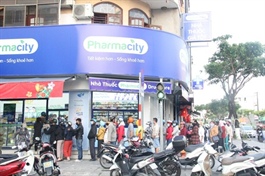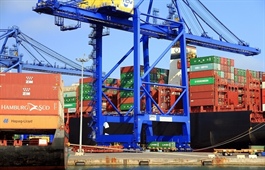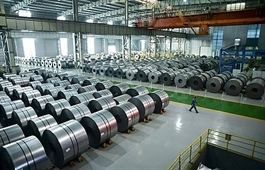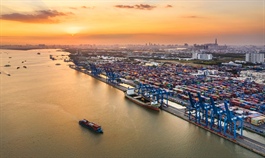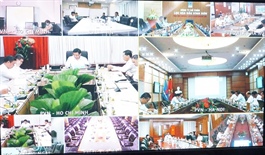Asian giants retain grip of Vietnamese logistics sector
Asian giants retain grip of Vietnamese logistics sector
There will be little change in current trends of mergers and acquisitions in Vietnam’s logistics industry this year as domestic players remain sellers and Asian investors continue to gain the upper hand.
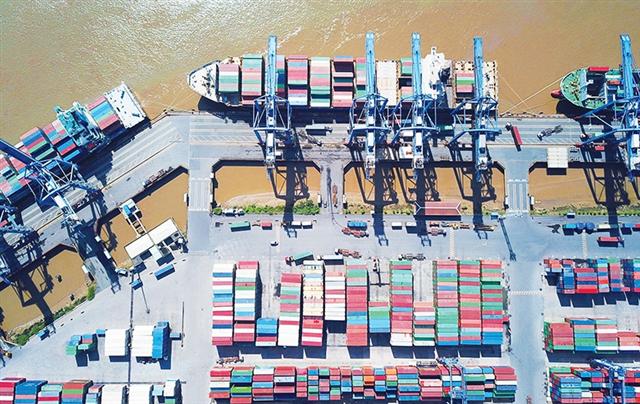
It is hoped that more European companies will become interested in Vietnam’s logistics arena via the EU-Vietnam Free Trade Agreement, photo Le Toan
|
Nguyen Tuong, senior advisor to the Vietnam Logistics Business Association’s (VLA) chairman, two weeks ago sat in his small office chatting with has recently talked to a potential South Korean investor about the possibilities of buying stake in a Vietnamese logistics firm.
He said that such meetings and business trips have been key in recent times and are expected to continue during 2021 as more merger and acquisition (M&A) deals emerge.
“Several South Korean and Japanese firms are working with the VLA on possible acquisitions of some Vietnamese logistics firms to expand their footprint here, where demand for qualified logistics services are growing,” he told VIR.
According to Tuong, there is no change in the M&A trend in the logistics industry in terms of players and order. Asian investors, especially those from South Korea and Japan, have remained the most interested over the past few years. Back in 2019 the majority of M&A deals came from Asian buyers, with prominent transactions involving SG Holdings, CJ Group, and Shibusawa Warehouse.
“European firms may not be interested in this channel of investment much because there are differences in development levels and a long time is needed for market research, so there is not yet demand,” Tuong admitted.
In the order of dealmaking, Vietnamese logistics firms remain sellers in M&A transactions. “They are still weak in financial capacity and services, while its infrastructure is not much developed,” the VLA deputy secretary general explained.
According to VLA statistics, Vietnam now has more than 3,000 logistics service providers, of which 89 per cent are domestic Vietnamese firms, 10 per cent are joint ventures, and the remainder are foreign-invested. Despite the huge number, Vietnamese logistics firms are mostly small- and medium-size ones with traditional warehouses and weak infrastructure.
Tuong attributed the Asian interest to increasing trade and investment activities from the region, and among businesses of the two countries in Vietnam. As shown in statistics from Vietnam’s Ministry of Planning and Investment, South Korea and Japan remain Vietnam’s top foreign investors, making up about 20 per cent of the country’s total foreign investment, with more projected in the months to come.
Tuong elaborated that upcoming M&A deals will focus on trucking, warehouses, and the cold supply chain in the Mekong Delta and Ho Chi Minh City. “The infrastructure remains insufficient in Vietnam, especially the serious lack of a cold supply chain in the country,” he said. “Acquiring Vietnamese firms is increasingly attractive to foreign investors as it can help them lower costs – as local partners already have networks, manpower, and experience in the market. At present, foreign-invested firms have to lease Vietnamese-owned infrastructure to serve their business activities.”
According to the VLA, Vietnam’s logistics industry has been growing 14-16 per cent annually in recent times with annual market value of $40-42 billion. It also ranks 39 among 160 countries worldwide in terms of development and fourth in ASEAN, only behind Singapore, Malaysia, and Thailand.
While the trend in the logistics industry remains traditional, that in the real estate and manufacturing sectors is changing where domestic firms have been heading to acquire stakes of foreign ones to develop them into powerful multi-sector groups. For example, Masan Group has acquired 52 per cent of Proconco, and Vingroup made a purchase of 51 per cent of Mundo Reader.
After a year of silence in 2020 due to COVID-19, Tuong forecast that the M&A picture in the industry could eventually change in upcoming years with more involvement of European firms on the back of free trade agreements, as well as the restructuring of global supply chains.
According to the VLA, while some domestic Vietnamese logistics firms are merging with one another, they lag behind regional and global movements, with M&A being among the most bustling.
“M&A is one of the three key trends in the region and the wider world in a move to link sources of goods and integrate all the arisen service chains during transportation via ports,” said Tuong. “A port-centric approach will be inevitable in logistics because it helps cost optimisation, increase of added value, all-in service package, optimisation of human resources, improvement of competitiveness, and increased volume of transportation.”
Thus far, a number of major alliances of shipping lines made their debut in recent times with involvement of those calling at the Haiphong seaports in northern Vietnam such as the 2M Alliance of the world’s biggest shipping companies Maersk Sealand and MSC; the Ocean Alliance of CMA-CGM (France), COSCO (China), Ever Green (Taiwan); and the Alliance of HapagLoyd, Yangming (Taiwan), and One (Japan).
In addition to this, shipping lines are expanding operations by acquiring aviation service firms and establishing international multimodal transportation logistics firms which provide aviation transport services, shipping services, and other logistics. For instance, Maersk absorbed Damco’s air and ocean less-than-container-load shipping to combine it with Maersk’s logistics and services products.
Elsewhere, CMA CGM successfully completed acquisition of CEVA Logistics to confirm its position as a leading worldwide transport and logistics group. Similarly, Yang Ming established Yes Logistics, while Ever Green founded Eva Airlines, among others.
|
Tran Viet Huy - Managing director, Tracimexco, Supply Chains and Agency Services JSC The logistics service industry has not been affected too directly by COVID-19. Over half of logistics services providers (LSPs) have better income performance compared with pre-pandemic. This positive performance is taking place not only in once-specific logistics sectors, but also in freight booking, warehousing, and cooltrans. Local LSPs are interested in collaboration, joint ventures, and M&A deals with oversea partners not only for investment capital but also for better utilisation of each other’s strengths. South Korean, Japanese, Chinese, Thai, and Singaporean investors are interested in M&A in logistics, if there is potential local LSPs. The challenge is that most Vietnamese LSPs are small while overseas investors prefer such providers with an annual turnover over $15 million, and ideally $30-40 million. Filippo Bortoletti - Senior manager, International Business Advisory Dezan Shira & Associates Before 2020 the local logistics industry was very appealing for foreign investors. Even if COVID-19 had an impact on the overall number of M&A deals closed in 2020, transactions in logistics are likely to surge in a world post-pandemic. Firstly, Vietnam has a stable government which is valued extremely highly especially considering recent events in neighbouring countries, and legal certainty – with an ambitious plan for developing local transport infrastructure. Secondly, logistics in Vietnam is characterised by a strong presence of small- and medium-sized enterprises (SMEs) whose cash flows have been impacted by pandemic, creating further opportunities for M&A transactions in the industry. Lastly, as most local logistics firms are SMEs, M&A deals are likely to not trigger an M&A notification under the Law on Competition. Inflow of foreign investment into local logistics is an opportunity for the industry to further develop and it will likely improve overall competitiveness of Vietnam’s logistics in the global chessboard. Due to current composition of local logistics, SMEs constitutes the large majority of companies in the industry, and it is likely they are struggling with cash flow issues during pandemic. The inflow of capital will help local companies sustain their growth as Vietnam is continuing to become more and more relevant in international trade. Also, collaborations with foreign partners can foster application of new tech as well as widen reach of local players. M&As might determine a change in the industry leading a concentration process where a number of players increase their size and potentially emerge as market leaders. |




